The Intel 9th Gen Review: Core i9-9900K, Core i7-9700K and Core i5-9600K Tested
by Ian Cutress on October 19, 2018 9:00 AM EST- Posted in
- CPUs
- Intel
- Coffee Lake
- 14++
- Core 9th Gen
- Core-S
- i9-9900K
- i7-9700K
- i5-9600K
CPU Performance: Office Tests
The Office test suite is designed to focus around more industry standard tests that focus on office workflows, system meetings, some synthetics, but we also bundle compiler performance in with this section. For users that have to evaluate hardware in general, these are usually the benchmarks that most consider.
All of our benchmark results can also be found in our benchmark engine, Bench.
PCMark 10: Industry Standard System Profiler
Futuremark, now known as UL, has developed benchmarks that have become industry standards for around two decades. The latest complete system test suite is PCMark 10, upgrading over PCMark 8 with updated tests and more OpenCL invested into use cases such as video streaming.
PCMark splits its scores into about 14 different areas, including application startup, web, spreadsheets, photo editing, rendering, video conferencing, and physics. We post all of these numbers in our benchmark database, Bench, however the key metric for the review is the overall score.
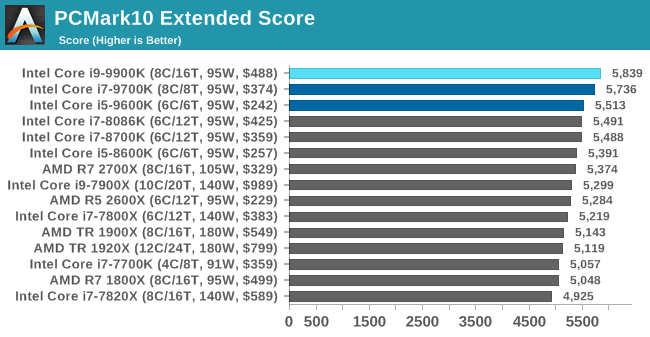
As a general mix of a lot of tests, the new processors from Intel take the top three spots, in order. Even the i5-9600K goes ahead of the i7-8086K.
Chromium Compile: Windows VC++ Compile of Chrome 56
A large number of AnandTech readers are software engineers, looking at how the hardware they use performs. While compiling a Linux kernel is ‘standard’ for the reviewers who often compile, our test is a little more varied – we are using the windows instructions to compile Chrome, specifically a Chrome 56 build from March 2017, as that was when we built the test. Google quite handily gives instructions on how to compile with Windows, along with a 400k file download for the repo.
In our test, using Google’s instructions, we use the MSVC compiler and ninja developer tools to manage the compile. As you may expect, the benchmark is variably threaded, with a mix of DRAM requirements that benefit from faster caches. Data procured in our test is the time taken for the compile, which we convert into compiles per day.
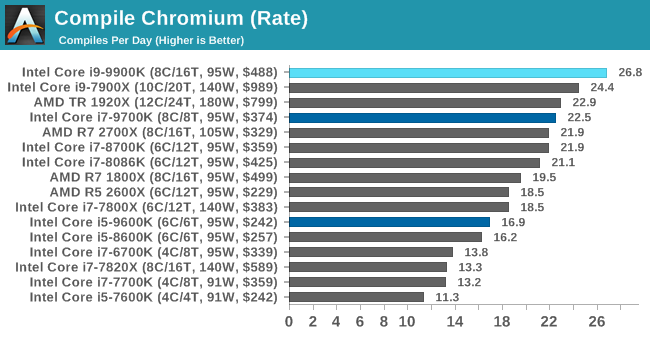
Pushing the raw frequency of the all-core turbo seems to work well in our compile test.
3DMark Physics: In-Game Physics Compute
Alongside PCMark is 3DMark, Futuremark’s (UL’s) gaming test suite. Each gaming tests consists of one or two GPU heavy scenes, along with a physics test that is indicative of when the test was written and the platform it is aimed at. The main overriding tests, in order of complexity, are Ice Storm, Cloud Gate, Sky Diver, Fire Strike, and Time Spy.
Some of the subtests offer variants, such as Ice Storm Unlimited, which is aimed at mobile platforms with an off-screen rendering, or Fire Strike Ultra which is aimed at high-end 4K systems with lots of the added features turned on. Time Spy also currently has an AVX-512 mode (which we may be using in the future).
For our tests, we report in Bench the results from every physics test, but for the sake of the review we keep it to the most demanding of each scene: Ice Storm Unlimited, Cloud Gate, Sky Diver, Fire Strike Ultra, and Time Spy.
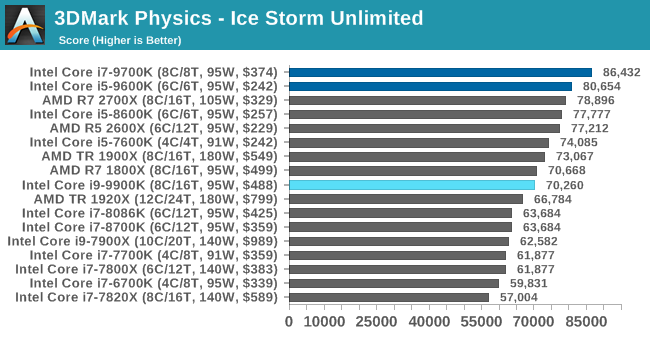
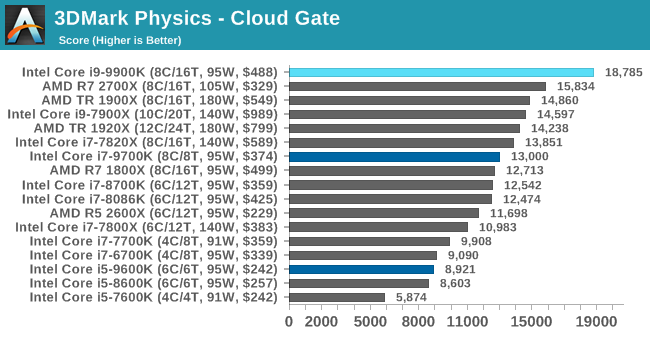
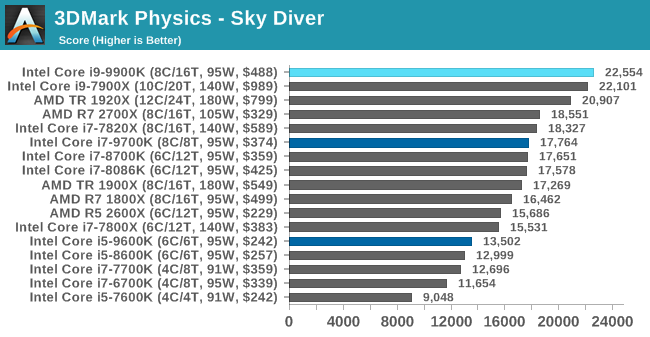
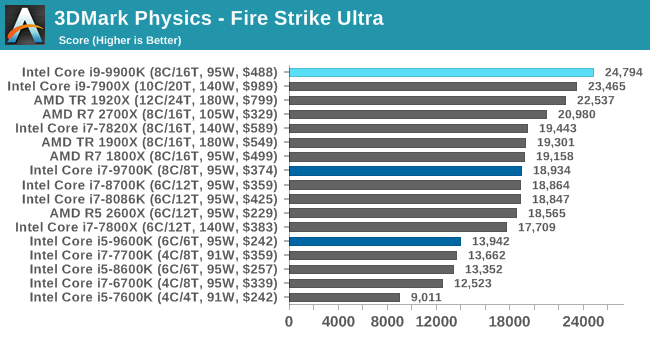
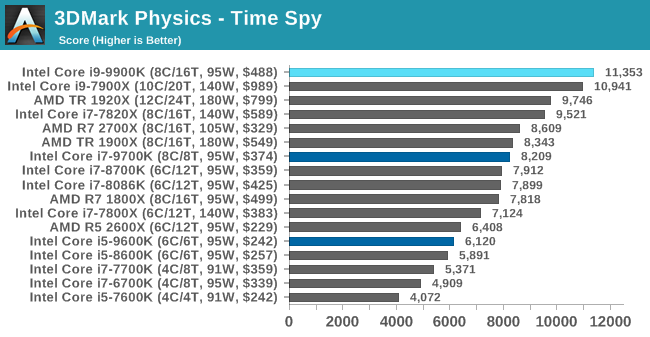
The older Ice Storm test didn't much like the Core i9-9900K, pushing it back behind the R7 1800X. For the more modern tests focused on PCs, the 9900K wins out. The lack of HT is hurting the other two parts.
GeekBench4: Synthetics
A common tool for cross-platform testing between mobile, PC, and Mac, GeekBench 4 is an ultimate exercise in synthetic testing across a range of algorithms looking for peak throughput. Tests include encryption, compression, fast Fourier transform, memory operations, n-body physics, matrix operations, histogram manipulation, and HTML parsing.
I’m including this test due to popular demand, although the results do come across as overly synthetic, and a lot of users often put a lot of weight behind the test due to the fact that it is compiled across different platforms (although with different compilers).
We record the main subtest scores (Crypto, Integer, Floating Point, Memory) in our benchmark database, but for the review we post the overall single and multi-threaded results.
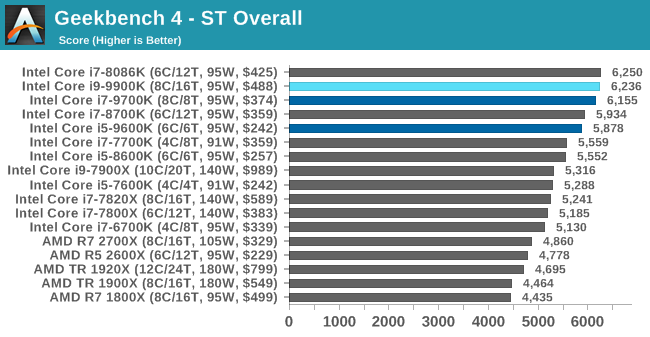
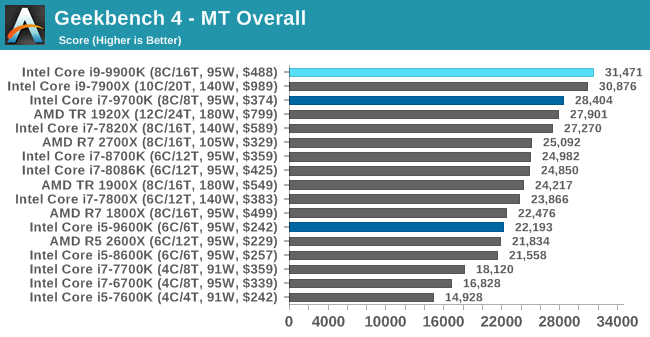










274 Comments
View All Comments
mapesdhs - Sunday, October 21, 2018 - link
Tell that to AutomaticTaco, his posts read like a shill mission atm.PG - Saturday, October 20, 2018 - link
How is the 2600X beating the 2700X in Ashes ?How is the 1800X beating the 2700X in AES?
2700x results are too low in some areas.
Nikorasu95 - Saturday, October 20, 2018 - link
Did I just fu*king downgrade by purchasing the i9 9900K when I have the i7 8700K? Like WTF? Some gaming results show the i7 is beating the i9. Like what is going on here? The i9 should be ahead of both the i7 8700K, and 8086K in all gaming tests considering it has 2 extra cores. Once again WTF is going on here with these results? They are inconsistent and make no sense!eastcoast_pete - Saturday, October 20, 2018 - link
@Ian / Anandtech: With the high premium over the MSRP for a 9900K, the difference vs. an 8700K is easily $ 200 as of now. So, here a suggested comparison that even stays in the Intel family: A comparison of a system with the 9900K with the (obligatory) high-end air cooler (so, another $ 100) vs. an 8700K based system at the same price point. Both with the identical graphics card (1080 GTX or 2070), but with the money saved with the 8700K then spent on delidding, a nice liquid cooler AND really fast DDR4? I believe that latter could really make a difference: While Intel's memory controller specifies rather slow DDR4 RAM, it's well known that one can effectively make use of much faster DDR4 RAM, and that has been shown repeatedly at least for the 8700/8700K. So, in a dollar-for-dollar matched comparison, would the 9900K then still be the king of the hill? I, for one, doubt it.eastcoast_pete - Sunday, October 21, 2018 - link
I have to recall my own comment, after checking prices at Newegg and Amazon. The current Intel 14 nm shortage has now also driven 8700/8700K prices far above their MSRP. This invalidates the performance/price = value equation my comment was based on, although the 8700K is still notably less than the even more overpriced (and out of stock) 9900K. Right now, building an Intel i7 rig is really questionable, unless one really, really wants (thinks one needs) those last few fps in some games and has plenty of money to burn. Assuming one uses the same video card, a Ryzen 2700 (or 2700x) setup with 16 GB of fast DDR4 RAM is cheaper, and if overclocking is on your mind, spend the difference to an 8700 (K or not) on a good liquid cooling setup.mapesdhs - Sunday, October 21, 2018 - link
For gaming, what it effectively does is push the "on the same budget" equation firmly into the camp of buying a 2700X and using the saving to get a better GPU. Only time this wouldn't apply is if someone does not have any kind of budget limit, but that has to be a tiny and largely irrelevant minority.SaturnusDK - Tuesday, October 23, 2018 - link
If you're planning to have a decent GPU and game at 1440p or higher then absolutely no Intel CPUs, at any price point, at the moment makes sense to buy. The 2700X is less than $300 at the moment, about half the price of a 9900K, and the 2600 is $160 at the moment, about half the price of a 8700K. Both AMD CPUs match or is only marginally behind the respective core/thread Intel equivalent at double the price.coburn_c - Saturday, October 20, 2018 - link
Under the Mozilla Kraken label you have a power consumption graph.Rumpelstiltstein - Saturday, October 20, 2018 - link
"Intel Core i9 9900K: The fastest gaming CPU"Uh, really Intel? Looks like that's the 9700K.
The Original Ralph - Saturday, October 20, 2018 - link
Looks like all this might be a moot point for awhile: Amazon hasn't started shipping, Newegg is not only stating "out of stock" but "NOT AVAILABLE" and B&H photo is showing availability date as "JAN 1, 2010" - i kid not. Suspect there's an issue with intel deliveries